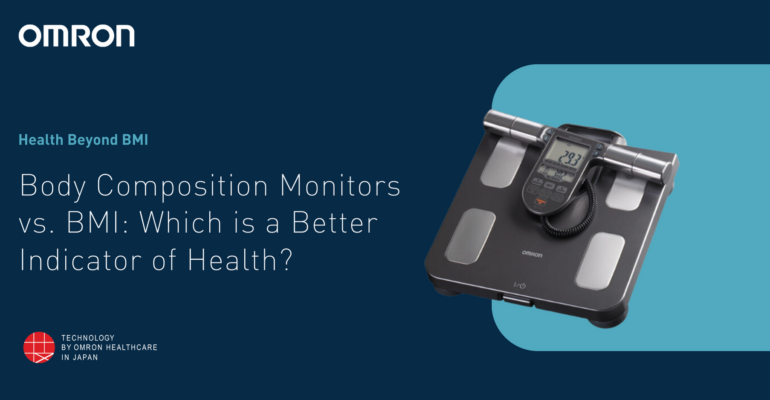Body Composition Monitors vs. BMI: Which is a Better Indicator of Health?
November 17, 2023 2024-02-23 12:35Body Composition Monitors vs. BMI: Which is a Better Indicator of Health?

Body Composition Monitors vs. BMI: Which is a Better Indicator of Health?
In the quest for better health and fitness, we often find ourselves relying on various metrics and indicators to track our progress. Among these, body mass index (BMI) has been a longstanding and widely recognized tool for assessing an individual’s health status. However, as technology has advanced, we now have access to more sophisticated methods of gauging our health, including body composition monitors. This raises a fundamental question: which is a better indicator of health—BMI or body composition monitors?
To answer this question, it’s essential to understand what BMI and body composition monitors are, how they work, and their respective strengths and limitations.
BMI: The Old Standard
Body Mass Index, or BMI, is a simple formula to estimate an individual’s body fat based on height and weight. The formula is BMI = weight (kg) / (height (m) * height (m)). The result is a single number that falls into several categories: underweight, average weight, overweight, or obese. It is a quick and easy way to categorize individuals and make general health recommendations.
While BMI has been widely used for decades and provides a rough estimation of a person’s body fat, it has significant limitations. For instance, it doesn’t account for muscle mass or fat distribution. This means that two individuals with the same BMI may have vastly different body compositions.
A bodybuilder, for example, could have a high BMI due to their muscle mass, while a person with low muscle mass and higher body fat may have a similar BMI. In this case, BMI fails to distinguish between the two.
Moreover, BMI is not sensitive to other factors that impact health, such as age, gender, bone density, and overall fitness level. It’s a one-size-fits-all approach to health assessment, which doesn’t provide a comprehensive view of an individual’s well-being. As a result, it has been criticized for its lack of precision and relevance in today’s health-conscious society.
Body Composition Monitors: A New Frontier
Body composition monitors, as opposed to BMI, are a more comprehensive and multidimensional technique for monitoring one’s health. These monitors utilize technologies like bioelectrical impedance analysis (BIA), dual-energy X-ray absorptiometry (DEXA), and air displacement plethysmography (ADP) to provide a detailed picture of an individual’s body composition. They measure not only body fat but also muscle mass, bone density, water content, and more.
One of the most significant advantages of body composition monitors is their ability to differentiate between muscle and fat. This is particularly crucial because muscle and fat have distinct effects on health. A person with a healthy BMI but low muscle mass may still be at risk for various health issues, while someone with a higher BMI but a significant muscle mass might be perfectly healthy. Body composition monitors account for these differences and provide a more accurate assessment.
In addition, these devices can provide information on body fat distribution, which is important as not all fat is the same. Visceral fat, the fat that accumulates around internal organs, is associated with a higher risk of metabolic diseases. In contrast, subcutaneous fat, which is found just beneath the skin, has fewer health implications. Body composition monitors can distinguish between these types of fat and help individuals make informed decisions about their health.
The Strengths of Body Composition Monitors
- Precision: Body composition monitors provide a more accurate and detailed assessment of an individual’s health compared to BMI. This precision is valuable for tracking changes in body composition over time and making tailored health and fitness recommendations.
- Muscle-Fat Differentiation: They distinguish between muscle and fat, allowing for a more nuanced evaluation of health. This is particularly beneficial for athletes and individuals engaged in strength training who may have higher muscle mass.
- Distribution Insights: These monitors reveal the distribution of body fat, helping identify potential health risks associated with visceral fat.
- Personalized Health Recommendations: With a deeper understanding of one’s body composition, individuals can receive more personalized recommendations for diet and exercise tailored to their unique needs and goals.
The Limitations of Body Composition Monitors
- Cost: Body composition monitors can be expensive, making them less accessible to some individuals.
- Accuracy Variability: The accuracy of these monitors can vary based on the specific technology used, the quality of the device, and an individual’s hydration status, which can affect BIA measurements.
- Clinical Setting: Some of the most accurate body composition monitors, like DEXA scans, are typically only available in clinical settings, which can limit their accessibility.
A New Approach to Health Assessment
When it comes to the debate between body composition monitors and BMI, there is no doubt that body composition monitors provide a more accurate and comprehensive health assessment. However, BMI has yet to catch up. BMI can still be used as a quick and low-cost initial health evaluation tool, as well as a valuable population-level statistic.
The choice between BMI and body composition monitors depends on individual choices and goals. For instance, if you’re looking to gauge your health status quickly and don’t have access to a body composition monitor, BMI can provide a rough estimate. However, for those who want to dive deeper into their health assessment, mainly if they are engaged in fitness or body transformation, body composition monitors offer a more precise view.
Conclusion
The choice between the BMI and Body Composition Monitor, however, is determined by individual goals, circumstances, and the availability of resources. When it comes to health, one size doesn’t fit all, and a nuanced approach that considers both BMI and body composition is often the best way forward. Remember, health is a holistic concept, and no single number can capture the complete picture.
Reference:
- https://my.clevelandclinic.org/health/articles/9464-body-mass-index-bmi
- https://www.cdc.gov/healthyweight/assessing/bmi/adult_bmi/index.html
- https://www.nhlbi.nih.gov/health/educational/lose_wt/risk.htm#:~:text=Although%20BMI%20can%20be%20used,others%20who%20have%20lost%20muscle.
- https://www.ncbi.nlm.nih.gov/pmc/articles/PMC6366261/
- https://www.medicalnewstoday.com/articles/body-fat-scale-accuracy#body-fat-vs-bmi
- https://www.omronbrandshop.com/health-and-lifestyle/benefits-of-body-composition-monitors/
- https://www.healthline.com/health/body-fat-scale-accuracy#other-measurement-tools






